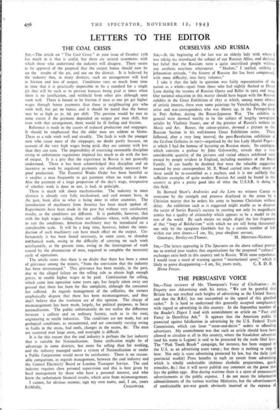THE COAL CRISIS
LETTERS TO THE EDITOR Ste,—The article on " The Coal Crisis " in your issue of October 15th has much in it that is useful, but there are several statements with which those who understand the industry will disagree. There seems to be approval of the proposal that the output bonus should now be on the results of the pit, and not on the district. It is believed by the industry that, in many districts, such an arrangement will lead to friction and loss of output. Conditions vary so much from time to time that it is practically impossible to fix a standard for a single pit that will be such as to prevent bonuses being paid at times when there is no justification, and withheld from other pits although men work well. There is bound to be friction if men at one pit get higher wages through bonus payments than those at neighbouring pits who work well, but get no bonus, and it should be noted that the bonus may be as high as 2S. 6d. per shift. The position would be met to some extent if the payment depended on output per man shift, but even with that arrangement, there would be ill feeling and friction.
Reference is made to the causes of reduced production and stoppages. It should be emphasised that the older men are seldom to blame. These as a rule work well and steadily. The fault is with the younger men who cause most of the stoppages, no doubt partly because, on account of the very high wages being paid, they are content with less than they can earn. The impossibility of exercising reasonable discipline owing to unfortunate regulations imposed has much to do with the loss of output. It is a pity that the experience in Russia is not generally understood. There it has been acknowledged that discipline and an incentive to work by regulated payments are absolutely necessary for good production. The Essential Works Order has been harmful as it enables a man frequently to get payment when no work is done. Also the payment of a large proportion of the day's wage, irrespective of whether work is done or not, is bad, in principle.
There is much talk about mechanisation. The industry in most districts is already very fully mechanised, and coal owners have, in the past, been alive to what is being done in other countries. The introduction of machinery from America has been much spoken of. Experiments have been made in the past but without very satisfactory results, as the conditions are different. It is probable, however, that with the high wages ruling, there are collieries where, with adaptation to suit the conditions, American machinery may be introduced on a considerable scale. It will be a long time, however, before the intro- duction of such machinery can have much effect on the output. Un- fortunately it has been found necessary, in some cases, to abandon methanical work, owing to the difficulty of carrying on such work satisfactorily, at the present time, owing to the interruption of work caused by the absenteeism of men, required to complete the necessary cycle of operations.
The article states that there is no doubt that there has been a sense of grievance among the miners, " from the conviction that the industry has been mismanaged." This grievance has been mainly, in the past, due to the alleged failure on the selling side to obtain high enough prices, to enable higher wages to be paid. Combination for selling, which came into operation some years ago, has largely taken away any ground that there has been for this complaint, although the consumer has suffered. As regards management of the collieries, the owners emphatically dispute that there has been mismanagement, and they don't believe that the workmen are of this opinion. The charge of mismanagement has been made, largely, for political purposes, to force nationalisation. The public unfortunately do not realise the difference between a colliery and an ordinary factory, such as in the steel, engineering or textile industries. The conditions are not made, but are geological conditions, as encountered, and are constantly varying owing to faults in the strata, bad roofs, changes in the seams, &c. The men are scattered over large areas, and oversight is difficult.
It is for this reason that the coal industry is perhaps the last industry that is suitable for Nationalisation. Some unification might be of advantage in some districts, but more for selling than for working, and the industry managed under a system of Nationalisation or under a Public Corporation would never be satisfactory. There is no reason- able comparison, as regards management, between the coal industry and the Central Electricity Board or London Transport Service. The coal industry requires close personal supervision and this is best given by local management by those who have a personal interest, and who know the unfortunate financial results, which arise from mismanagement.
I cannot, for obvious reasons, sign my own name, and, I am, yours


























 Previous page
Previous page